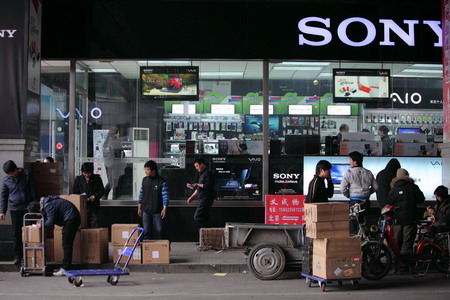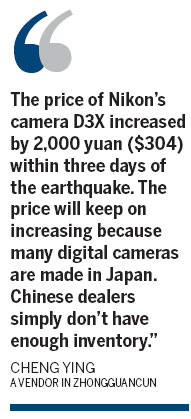-
News >Bizchina
Electronics market faces shortages
2011-03-15 09:58
Disaster forces several Japanese companies to close their factories
A Sony store in Zhongguancun, the center of electronics products in Beijing. Some electronic devices made by Japanese brands saw price hikes on Monday following the devastating earthquake, which is hurting the supplies to China, vendors say. [Photo / China Daily]
BEIJING - China's electronics market has been severely affected by the aftermath of the earthquake and tsunami that hit Japan on Friday.
That's because many Japanese electronics companies have closed their factories in the country, meaning that supply in certain Chinese markets is facing intense shortages that could last until June.

Zhongguancun, Beijing's largest retailing market for electronic goods by size, is the barometer of the market for Chinese digital products.
Unlike major retail chains, which place orders ahead of time, Zhongguancun is a market that is highly susceptible to supply and demand.
A swathe of top-name Japanese electronics manufacturers, including Sony Corp, Toshiba Inc, Canon Inc and Panasonic Corp, have been forced to close their factories in areas affected by Friday's disaster. Up to six Sony manufacturing plants have been shut down.
"The price of Nikon's camera D3X increased by 2,000 yuan ($304) within three days of the earthquake," said Cheng Ying, a vendor in Zhongguancun.
"The price will keep on increasing because many digital cameras are made in Japan. Chinese dealers simply don't have enough inventory."
Friday's tsunami swept away 120,000 Sony PlayStation3 units. That resulted in the price of the PlayStation in the Chinese gray market increasing by 200 yuan almost immediately.
"The 120 gigabyte version is already out of stock. Because of the shortage caused by the earthquake, we will have to raise the price even higher," said Lei Tao, a games vendor from Zhongguancun.
Japan exports electronic products worth about $3 billion to China every month, according to the Shenzhen-based securities company Guosen Securities.
Many Chinese semiconductor manufacturers have seen their share price rise in the days following the earthquake, but Vincent Gu, an industry analyst from the US-based market analysis company iSuppli Corp, said that the effect was "limited" to the Chinese market because most of the destroyed facilities supplied the Japanese, rather than the international, market.Most of the Japanese companies are still evaluating their losses and are very cautious about commenting on the supply shortage in the Chinese market.
For Toshiba, the Chinese market accounts for 21 percent of their sales revenue in Asia, excluding Japan.
The company's spokesman told China Daily that their flash memory plant, which produces Apple Inc's iPad 2, was unaffected by the earthquake.
However, he also said that the company is still "checking and assessing the damage caused by the earthquake".
Sony's spokeswoman told China Daily that the main priority is to safeguard the well-being of its employees in the affected areas, and has donated products and money to help Japan recover from the disaster, but "the loss to Sony is significant", she told China Daily.
